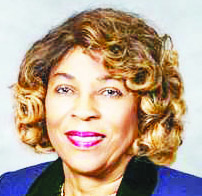
Senator Joyce Waddell's 2021-2022 Updates

January 13th, 2021 begins the new 2021-2022 biennium and swearing in for legislators. The swearing is scheduled for 12 noon and the work of legislators will begin. The biennium is the start of a two-year budget process for the state of NC. It is made up of a long session and a short session. The long session is the time the budget is created, and the short session is the time that the budget is finalized.
I am sure I speak for all legislators by saying, the work for the people of NC is upon us, so let us get busy!
Sincerely,
Joyce Waddell
My committee assignments for the 2021-2022 Biennium: Education/Higher Education, Finance, Pensions, Rules, Select Committee on Prison Safety, Appropriations on Health and Human Services.
COVID Precautions
North Carolina Gov. Roy Cooper on Wednesday said he is extending North Carolina’s modified stay-at-home order for three weeks, including a curfew, while the state’s top health official issued her own order to direct people to only leave home for essential activities. The stay-at-home order requires people to stay home from 10 p.m. to 5 a.m. It now will expire on Jan. 29 at 5 p.m. North Carolina has been under Phase 3 of restrictions since the fall, an executive order that has been extended several times. Cooper’s executive order was set to expire Friday.
Dr. Mandy Cohen, secretary of the N.C. Department of Health and Human Services, also issued a directive telling people to stay home unless they are going to work, school, to exercise, to attend to health care needs or to get groceries. “Simply put, don’t go places indoors where people aren’t wearing masks,” Cooper said. Cooper on Wednesday said vaccine distribution is his administration’s “top priority,” but he and Cohen also warned that it will be months before the state will receive enough vaccine to stop the pandemic, heightening the importance of other public health measures. “It will take many months to vaccinate everyone who wants it. Until then, I do not want to lose any more North Carolinians to this pandemic,” Cohen said.
The orders come as all but four counties are considered red or orange under North Carolina’s coronavirus alert system, including 84 with critical spread. Last month, 65 were classified as having critical levels of community spread. Orange and Chatham counties are among those four counties that are considered “yellow,” for significant community spread. Wake and Durham are in the orange category, for substantial. The strain COVID-19 is having on local hospitals is among the factors North Carolina considers for the county alert system. Many hospitals throughout North Carolina are scaling back elective surgeries and shifting duties as COVID-19 numbers spike. “This is the most worried I’ve been through this pandemic. I think our hospitals are managing, but it’s going to take all of our work to make sure we don’t overwhelm our hospitals,” Cohen said.
The last executive order extension in December included the addition of the curfew. Phase 3 includes restrictions on capacity at restaurants and bars, and bars must be outside only. On-site alcohol sales also stop at 9 p.m., as part of the latest executive order, though Cooper later said bars and restaurants could sell mixed drinks to-go. However, there are many exemptions, including for essential workers, work commutes, childcare, medical needs, grocery shopping and getting food or gas. North Carolina has remained under a statewide mask mandate since June.
COVID Deaths
Over 7,000 people have died in North Carolina due to COVID-19 since the first coronavirus case in the state was reported nearly 10 months ago. Over about the last six weeks, 2,000 people have died from the virus. North Carolina surpassed 5,000 deaths on Nov. 21. The state reported a cumulative total of 7,076 deaths on Wednesday, according to the N.C. Department of Health and Human Services. DHHS reported 6,952 new cases on Wednesday. There has been a total of 582,348 confirmed cases in North Carolina since the beginning of the pandemic.
Among the tests reported by DHHS on Monday, 17.8% returned positive, a record for the state and far above the 5% goal that state health officials want. The seven-day average for positive tests sits at 15.4%. As of Wednesday, there are now 3,893 people with COVID-19 in hospitals across the state. It’s the highest of the pandemic for the seventh straight day and an increase of over 100 since Tuesday. Case and hospitalization data reported is preliminary and subject to change upon further investigation. Available hospital beds are at 4,379, a decrease from 4,909 on Tuesday. There were 5,406 available beds on Monday. Available beds in intensive care units across the state decreased to 328, down from 366 on Tuesday and 410 on Monday.
Vaccine Distribution
Gov. Roy Cooper has mobilized the state’s National Guard to help with North Carolina’s vaccine effort that is showing delays and logistical challenges just a few weeks into the distribution. “Ensuring COVID-19 vaccines are administered quickly is our top priority right now. We will use all resources and personnel needed,” Cooper wrote in a tweet Tuesday. Information about the number of Guardsmen and details of their duties and locations has not been provided. Data released Monday by the Centers for Disease Control and Prevention shows that North Carolinians are receiving their first dose of vaccine at a slower rate than much of the rest of the country. The state’s rate of 966 vaccinations per 100,000 people, as of 9 a.m. Monday, was the sixth lowest in the country.
As of 8:30 a.m. Tuesday, 109,799 North Carolinians have received the first dose of a COVID-19 vaccine, according to data released by the N.C. Department of Health and Human Services. Both Pfizer and Moderna vaccines that have received Food and Drug Administration emergency use authorization require two shots to be fully effective, and 461 people statewide have been given both shots. DHHS cautions that the data is preliminary, and reporting can lag by as much as 72 hours. The state only reports updated vaccination data on Tuesdays. An additional 13,338 people who live or work at long-term care facilities had received first doses from CVS or Walgreens through a partnership with the federal government. The pharmacies have received 165,990 doses of North Carolina’s total allocation.
Last week, North Carolina officials announced an update to the state’s vaccination plan. Anyone who is at least 75 years old will be in the first group of the state’s updated Phase 1b, The News & Observer reported. Next eligible for the vaccine will be people who are at least 50 years old and working as either health care providers or frontline essential workers. Some counties have started the rollout this week to people in the 1b phase. But Gaston and Mecklenburg counties have reported that vaccine registration hotlines have faced difficulties, The Charlotte Observer reports.
The N.C. General Assembly’s Joint Legislative Oversight Committee on Medicaid and N.C. Health Choice plans to discuss the state’s vaccine plan during its Jan. 12 meeting, according to an email from Senate leader Phil Berger’s office. Speaker Tim Moore’s office said in a statement that his office is “working with health committee leaders to ensure this oversight meeting addresses concerns with the distribution expressed by state lawmakers and stakeholders.”
Other counties don’t anticipate moving into Phase 1b until next week at the earliest. Wake County officials have warned that the large number of healthcare workers in the county means it will likely take them longer to move through Phase 1a than many other places in the state. Phase 1a includes vaccinating frontline healthcare professionals and those who work with COVID-19 patients as well as people who live in long-term care facilities and nursing homes. Wake County has not yet decided how people will be able to sign up for vaccination slots, but hopes to finalize the process this week, Leah Holdren, a Wake County spokeswoman, wrote in an email to The News & Observer Monday. “We can’t stress enough how little vaccine there is for the population of Wake County,” Holdren said. “Right now, there is not enough vaccine to move to Phase 1b just yet.”
Unemployment Claims
The N.C. Division of Employment Security reported Tuesday that the temporary expiration of federal extended unemployment benefits has contributed to another surge in daily claims. There were 13,802 claims filed Monday and 15,870 claims on Sunday. The record daily high for the pandemic stands at 43,297 claims filed on Dec. 27 — the day after two primary federal benefit programs expired. DES said in a Dec. 27 statement that “the increase in claims filed after Dec. 26 does not indicate ... new claimants entering the system.”
As of 10 a.m. Tuesday, the federal PEUC (pandemic emergency unemployment compensation) and PUA (pandemic unemployment assistance) programs had combined to pay $1.54 billion to North Carolinians. Payments were projected to resume this week, retroactive to Dec. 26, and last through mid-March. DES said about 47,000 North Carolinians were affected by the expiration of the PEUC and PUA programs.
Unemployment Restart
Unemployment benefits are restarting for people cut off when federal extensions ran out late last year, and a $300 boost laid out in a stimulus bill that passed Congress last month is rolling out as well, the N.C. Division of Employment Security said Wednesday. The increases were part of the latest coronavirus stimulus bill, which President Donald Trump signed into law on December 27. A pair of federal programs, designed to extend the normal 12 weeks of unemployment aid North Carolinians get through the state, and to cover far more people than are normally eligible, expired the day before. Now the state is essentially restarting those programs after some back and forth with the U.S. Department of Labor over just how the programs will work.
“Eligible claimants are beginning to receive an additional $300 a week in Federal Pandemic Unemployment Compensation (FPUC) for the week that ended Jan. 2, 2021,” the state’s Division of Employment Security said in a memo Wednesday. That boost will last through mid-March. The division said it’s awaiting more guidance from the Department of Labor to implement other benefits laid out in the bill, including “information for claimants who previously exhausted benefits.” That information will be relevant who exhausted all state and federal benefits last year before the December 26 cutoff.
Although our legislative duties are beginning, I am still concerned with the amount of positive COVID numbers plaguing our state. I strongly suggest that we all continue to remain vigilant regarding being safe.


